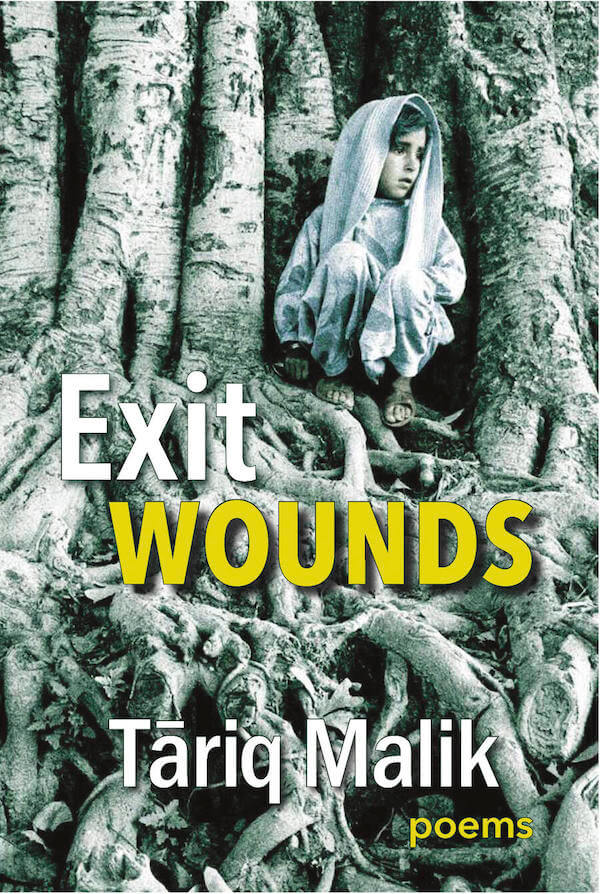Journey to a present
Tāriq Malik’s Exit Wounds reviewed
Exit Wounds
By Tāriq Malik
Caitlin Press, 2022
Share Article
Tāriq Malik’s latest book, Exit Wounds, is a long episodic non-linear journey into a culminating present, as a first-generation immigrant in Vancouver, BC. Ultimately the emergence of being a wordsmith in the context of the colonial language – English, and the themes of disconnections and dislocations are posited as a result of the British colonial enterprise in pre-Partition India.
The poetry collection spans over four decades and inter-mingles reality with memory and myth. Malik boldly grounds this collection through ancestral beginnings with a trajectory that begins with him being the grandson of a lohar (metalsmith) to the desert terrains of Kuwait and then eventually settling in BC with his family.
Charting his journey brings him to the sandscapes of Kuwait where he lives as an interloper during his time working as an industrial chemist. In Malik’s desert he sojourns across shifting sands where dunes collapse over a night and like his life transform incrementally each day, as he dislocates from what he has known. In this land Malik ends the poem The Summer of Dunes with the evocative observation “the blood tastes of rusting nails”.
There are surreal moments as we travel across timelines with Malik, as is captured in his Star of The Show poem – a street performance involving a dancing monkey and a young girl balancing on a pole held vertically on the thumb of a strong man, engages the audience but the real star of the show is the contortionist who at the end of the day is afforded enough paisa to buy a new comb. There is a delineation of what impoverishment evokes for all these people at the end of the show as audience members throw pennies on the spread-out saree.
Striking in Malik’s collection is his interweaving of religious iconography as he adds in the poem Suman Bukmun Umyun (Arabic for Deaf, Dumb and Blind) Quranic thoughts that are captured in italics
This earth is a mosque
And the land beneath your feet is holy
Pray anywhere
In your quest for understanding
seek the end of the world for knowledge
even it if takes you to China
The poem is inspired by Malik’s visit to the graveside of Abdus Salam, Pakistan’s first Nobel prize winner for physics, the poem explores the dual role of Salam’s advocacy for science, but with the belief in Islam as a foundation. What compels Malik is the redaction of “Muslim” from the headstone which erases the fact that Salam was a believer in two methodologies of life.
As a homage to the original ancestral territory known as Punjab (Five Rivers), Malik takes on a magical myth-making storytelling voice in the poem Bahadar Singh and the Ballad of Five Rivers, to speak to the richness of the soil and the many armies that waged war to control the areas over many different time periods. In a melancholic observation he notes that he does not remember who won or lost, but through the poem he crystalizes the life of the region with its boisterous peoples and seasonal melas (agrarian festivals). Through this memorializing, we are opened to a life of belonging for Malik as he reflects what it was like to be connected to a landscape that was yours from birth.
The section entitled EntryExit Wounds covers some of the most provocative poems in this collection. In this section we encounter poems about the origins of the name Tāriq, his sensitive memorialization of the passengers of the Komagata Maru, the passengers of Air India 182, and one poem on remembering the harrowing arrival of Robert Dziekañski in the poem Why We Are (YVR).
In the poem Encountering Terra Nullius, Malik explores the depredations of the British Empire in India known commonly as the British Raj. Here he notes:
you planted nothing
yet harvested endlessly
and in every season
with such ferocious greed
that the scorched lands groaned
Powerful and evocative, Malik captures the extremes of the British Raj’s actions to “civilize” the South Asian sub-continent, and after everything was harvested and carted off to England, the British found themselves close to bankruptcy following two world wars, and the only reason they left was the lack of resources to continue their control over the sub-continent.
Exit Wounds, Tāriq Malik’s poetry collection is an adroitly poignant read and offers a window into his poetic life writing trajectory that intersects with global histories, antiquarian mythologies and a hard look at contemporary refugee and migration journeys.








